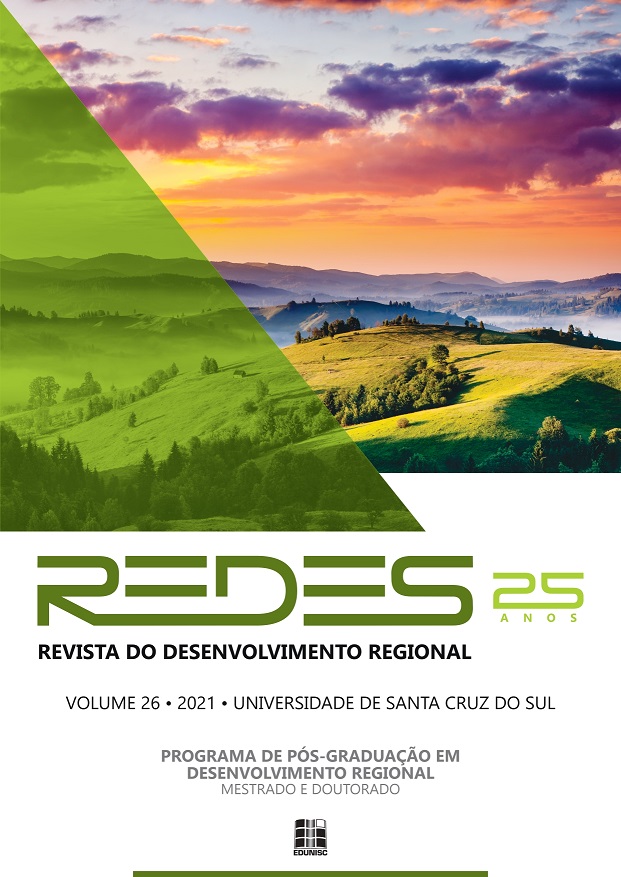Development and environmental conflict: the formation of the discourse of “empty spaces” in megaprojects on the south coast of Espírito Santo, Brazil
DOI:
https://doi.org/10.17058/redes.v26i0.14747Keywords:
Development, Environmental conflicts, Empty spaces, SpatialitiesAbstract
During the last decades in Brazil, the developmentalist discourse has promoted several actions that attracted investments for large construction projects. The south coast of the state of Espírito Santo, chosen as the adequate site for investments in transport and logistics infrastructure to support exports and modernize the oil and gas production chain, has been, since the early 2000s, a setting of transformations prompted by the announcement of future installation of ports, thermoelectric plants, construction of roads and railways, among other infrastructures. Such a process does not happen without conflicts. In a recent research focused on environmental conflicts originated from the clash of interests between port investments and fishing communities in the south of the state, it was found that a strategy used by agents to enable “development” was the formation of a discourse that highlights the “empty spaces”. This is a qualitative research based on ethnographic immersion, observations, document analysis and interviews with fishermen, government officials and representatives of the enterprises. This article aims to demonstrate the elements used to form this discourse and its opposite, which includes the spaces’ plenty diversity, expressed by the presence of traditional artisanal fishing communities. Findings show that the development actions, intending to be homogenizing, do not allow the existence of differences in space, what sparks the disputes that occur on the south coast of Espírito Santo, especially concerning the maintenance of the way of life for artisanal fishermen.Downloads
References
ALMEIDA, J. Da ideologia do progresso à ideia de desenvolvimento (rural) sustentável. In: ALMEIDA, J.; NAVARRO, Z. Reconstruindo a agricultura: ideias e ideais na perspectiva do desenvolvimento rural sustentável. Porto Alegre: Editora da UFRGS, 3a ed., 2009, p. 33-55.
BERNARDES, N. Expansão do povoamento no Estado do Paraná. Revista Brasileira de Geografia, v. 14, n. 4, p. 53–82, 1952.
C-PORT LOGÍSTICA OFFSHORE BRASIL LTDA. Relatório de impacto ambiental da Base de Apoio Logístico Offshore. Itapemirim-ES: [s.n.], 2012.
ESCOBAR, A. Territorios de diferencia: lugar, movimientos, vida, redes. Popayán-Colombia: EnVión, v. 53, 2013.
ESCOBAR, A. Pluriversal politics: the real and the possible. Durham,NC: Duke University Press, 2020.
ESPÍRITO SANTO. Secretaria de Desenvolvimento. 2016. Disponível em: <http://www.invistanoes.es.gov.br/>. Acesso em: 13 set. 2016.
ESPÍRITO SANTO EM AÇÃO. Espírito Santo em Ação. 2016. Disponível em: <http://www.es-acao.org.br/index.php?id=/institucional/espirito_santo_em_acao/index.php>. Acesso em: 13 set. 2016.
ESTEVA, G. Desenvolvimento. In: SACHS, W. Dicionário do desenvolvimento: guia para o conhecimento como poder. Petrópolis: Vozes, 2000, p. 59–83.
FLEURY, L. C. Conflito ambiental e cosmopolítica na Amazônia Brasileira: a construção da Usina Hidrelétrica de Belo Monte em perspectiva. 2013. 318f. Tese (Programa de Pós-Graduação em Sociologia) - Universidade Federal do Rio Grande do Sul, Porto Alegre, 2013.
ITAOCA OFFSHORE. Itaoca terminal marítimo: relatório de impacto ambiental. Itapemirim-ES: [s.n.], 2013.
MACIEL, D. P. O Estado na integração de territórios vazios à nação brasileira (1943-1968): atuação da Fundação Brasil Central na região Médio Araguaia. In: Anais do XXIV Simpósio Nacional de História. São Leopoldo: Unisinos, 2007. CD-ROM.
MASSEY, D.; KEYNES, M. Filosofia e política da espacialidade : algumas considerações. GEOgraphia, v. 6, n. 12, p. 7–23, 2004.
MOREIRA, V. M. L. Vazios demográficos ou territórios indígenas? Dimensões, v. 11, jul/dez, p. 137–144, 2000.
RAYNAUT, C. As relações ser humano/natureza: a arqueologia social de uma ruptura. Mimeo, p. 1-17, 2006.
RATZEL, F. Le sol, la société et l'état, L'Année Sociologique, ano 13, p. 1-14, 1898-1899.
RIST, G. The history of development: from western origins to global faith. 3a. ed. London; New York: Zed Books, 2008.
TPK LOGÍSTICA S. A. Relatório de impacto ambiental do Porto Central Presidente Kennedy/ES. Presidente Kennedy-ES: [s.n.], 2013.
ZANDONADI, D. Riqueza do petróleo: novo momento eleva investimento no Estado. Gazeta Online, Vitória - ES, 2014.



